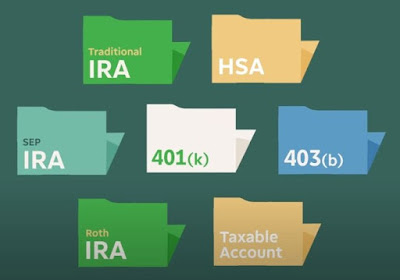What is a 401(k) and What Does 401k Stand For?
We'll look at three main concepts:
- Contributions,
- Investments, and
- Account management.
But first let's start with the absolute basics: the name. It's called a 401(k) because of the section of the IRS (Internal Revenue Service) code that sets out the rules for this type of account, section 401 subsection K.
Basically, the government allows companies to offer retirement savings accounts with certain tax advantages in an effort to encourage people to save for retirement.
Tax advantages are one of the main benefits of contributing to a 401(k).
When you sign up for a 401(k), you'll set an amount or % to be automatically taken out of each paycheck to fund the account.
With a traditional 401(k), the amount you contribute is deducted from your taxable income.
Let's say you earn $100,000 per year and contribute $10,000 to your 401(k).
That means your total taxable income for the year would be $90,000, reducing the amount you have to pay taxes on that year. In addition, the money you contribute to a 401(k) can grow tax-deferred, meaning you don't pay taxes on it until you withdraw it in retirement.
In the meantime, the money in the account can compound without being taxed. Some employers also offer a Roth 401(k), which allows you to contribute after-tax dollars.
Instead of decreasing your tax burden now, this allows you to take the money out tax-free during retirement. Only you can determine which 401(k) is right for you.
It depends on several factors, like how much you expect to earn later in life and whether you want tax benefits now or later.
Some people choose to contribute to both. Talk to a tax professional for more information. 401(k) tax benefits have some limits.
The money you put in a 401(k) is basically untouchable until you turn 59 and a half. If you withdraw money before then, you'll face an early withdrawal penalty and income tax unless you qualify for one of the few exceptions, like paying for substantial medical expenses or disability.
Overall, it's best to avoid jeopardizing your retirement savings with early withdrawals. The IRS limits how much you can contribute to a 401(k) each year.
These limits have changed over the years and can depend on your age, so it's best to check with the IRS or a tax professional.
Another major benefit of participating in a 401(k) is that some companies offer a match. That's extra money the company contributes to your account just for participating, and it doesn't count toward your individual limit.
So, say your employer matches 50% of all your contributions up to 6% of your annual salary. This means if you make $50,000 and you contribute that's $3,000 your employer would contribute $1,500 on top of that. If your employer offers a match, be sure to contribute enough to get the maximum amount.
Don't leave free money on the table. Keep in mind, some companies have what's called a vesting period. That's the period of time you have to work there before the money the company contributes becomes fully yours.
Check with your employer to learn more about your company's policy. Now that you understand contributions, let's talk about choosing investments.
401(k)s typically offer a limited number of investments, like mutual funds or exchange-traded funds. If you find the number of investment choices too limited, see if your employer offers a self-directed 401(k).
These plans may provide additional investment choices. Either way, you'll have to weigh the risks and fees associated with each investment.
It's generally best to not take the money out until you reach retirement age, so focusing on long-term investing rather than quick profits might be a prudent choice.
When managing your account, be on the lookout for the drawback of 401(k)s:
Fees
Some 401(k) providers charge additional administrative fees on top of the cost of individual investments. These fees are not always obvious, so check with your plan administrator or use an online 401(k) fee analyzer.
IRAs
If you're unhappy with the fees you're paying, you can consider other retirement accounts like Individual Retirement Accounts, or IRAs.
Even if your 401(k) offers limited investment choices or charges high fees, it may still be worth contributing enough to get the maximum match from your employer. The match may outweigh these drawbacks.
Over time, you'll likely work for several companies, which could mean you have many 401(k)s.
What do you do with those old accounts?
You can always combine them into your current 401(k) or an IRA through a process called a rollover. This allows you to move funds directly from one retirement account to another without incurring tax penalties.
Keeping your retirement savings in fewer accounts may make them simpler to manage.
The 401(k) is just one kind of retirement account, but the tax benefits and potential employer match make it a powerful way to invest for the future.
Contributing to a 401(k) is one of the simplest ways to pay yourself first and the other one is:
Retirement Portfolio Allocation | Traditional and Roth IRAs | Simplest Steps for a Retirement Portfolio Course
If you're saving for retirement, IRAs, also known as Individual Retirement Accounts, can offer significant tax advantages.
This post focuses on how to choose between two common types of IRAs:
- Traditional and
- Roth
Each provides different tax benefits.
In a taxable investment account, you have to pay annual taxes on any profits you earn, which can slow the growth of the account.
A benefit of both traditional and Roth IRAs is that your earnings aren't taxed while they're in the account, which can help your investments compound.
Where traditional and Roth IRAs differ is when you get tax breaks. You essentially have a choice of receiving a tax deduction now or tax-free withdrawals later.
Let me explain...
This means you may get a tax break in the years you contribute to the account. But, you still have to pay taxes sometime.
With a traditional IRA, you pay taxes on the money you withdraw from the account during retirement. Essentially, choosing a traditional IRA means you'll pay taxes in retirement, but you may get a tax deduction now.
Now, let's talk about Roth Accounts.

With a Roth IRA, contributions are not tax-deductible, meaning you don't get a tax break when you make contributions.
Once you contribute money to a Roth IRA, you won't have to pay taxes on your withdrawals during retirement. So choosing a Roth account means getting a tax break later.
So which one is better?
It depends. Based on your personal circumstances, it's possible that one type of account might be better for you.
The biggest factor is whether you think your tax rate during retirement will be higher or lower than your tax rate during the years you're contributing.
If you think your taxes are higher now than they'll be when you retire, a traditional IRA might be better.
For example, by retirement, your mortgage may be paid off or maybe your kids will be out of the house, so you'll need less income. With this lowered income during retirement, your tax rate may be lower.
A traditional IRA would allow you to pay taxes in retirement and take advantage of the lower tax rate rather than paying a higher tax rate now.
On the other hand, a Roth IRA may be the best choice if you think your tax rate could be higher during retirement.
For example, if you're a young investor who's just starting a career, you may expect to pay higher taxes later in your career and into retirement.
By choosing to pay taxes now at a lower tax rate, you may benefit by paying less than you would in retirement. Plus, you'll have the comfort of knowing you'll be unburdened by taxes when you withdraw from your Roth IRA during retirement.
However, there are a few things to remember.
- First, it can be very difficult to predict future tax rates. As a result, many experts recommend contributing to both a traditional and a Roth account as a way to diversify your tax savings.
- Second, if you think you'll need to access money in your IRA before you retire, a Roth IRA may be a better choice.
With a Roth IRA, you're able to withdraw your contributions at any time though if you withdraw earnings on those contributions, they may be subject to income taxes and penalties.
But with a traditional IRA, any withdrawals prior to age 59 and a half are subject to a penalty and taxes.
However, some withdrawals for things like higher education, medical expenses, or the purchase of a first home might not be penalized in certain circumstances.
- Third, there are limits on IRA eligibility and tax benefits. For example, if you already have a retirement plan through your employer, traditional IRA contributions may not be tax-deductible.
And some investors may make too much money to contribute to a Roth IRA. Be sure to check the IRS's income limits and consult a tax professional.
While it can be hard to predict your future tax rate, both traditional and Roth retirement accounts can help you maximize your retirement savings with tax benefits.
The most important thing is to contribute early and often.
Thanks for reading the post...







